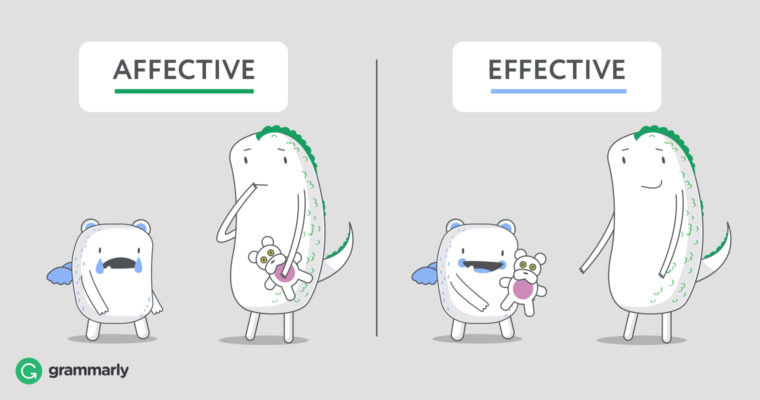
Is affective just another word for effective? Are the two words similar and entangled in the way the verbs affect and effect are? No, affective is not just another word for effective. And affective and effective are not derived from the verbs affect and effect. They come from the nouns affect and effect.
Affective is usually used in the field of psychology and addresses emotions and feelings. Effective is common in everyday language to describe something that produces a desired result.
The difference between affective and effective
Affective and effective are adjectives with no boundary issues, at least not with each other. There’ll be none of that nonsense “affect” and “effect” like to pull off, so let’s dive into what makes the two adjectives so different from each other.
- Affective describes something that has been influenced by emotions, is a result of emotions, or expresses emotion.
- Effective describes something that produces a desired result.
- Effective comes from the noun effect, which means result. Affective comes from the noun affect, which does not mean the same thing as the verb affect.
Affective definition
An affective action would be an action that was caused by emotions. Affective things are like that—they are either caused by emotions or feelings, influenced by them, or are otherwise related to emotions. You can also use affective to say that something expresses emotions.
Affective is an adjective formed from the noun affect, which appears quite frequently in psychology-related writing. Imagine that you’re looking at someone who is experiencing a strong emotion—every manifestation of that emotion you can observe is an affect. At least, that’s the easiest way to understand it.
Effective definition
When you want to say that something you’re doing is causing results, you can say that it’s effective. Specifically, something is effective when it produces the results you want. And that’s a very appropriate way to define effective, because we get the adjective from the noun effect—a result. It’s not too hard to remember the difference between affective and effective. You just have to use a small upside-down mnemonic device—when it comes to affective and effective, a is for emotion, and e is for action.
Why you might have trouble with affective
One reason it’s sometimes easy to mix up the meaning of the adjective affective is that the noun it’s derived from, affect, is spelled the same as the verb affect, but the two have very different meanings.
While affect the noun, as we already explained, relates to the emotions we experience, affect the verb means to cause an effect, or to influence.
Examples of affective and effective in sentences
Doctors also report they have patients who seem to experience a summer version of seasonal affective disorder.
—NBC News
Only humans were thought to have this ability of affective forecasting, in which prior experiences are used to conjure up mental pictures about totally new situations.
—Science Daily
Educators are always on the look-out for ways to make their teaching more effective, and it seems the secret to effective learning may be less study not more.
—Forbes
Twitter’s rights to the MLB and NHL games are effective immediately.
—Variety






